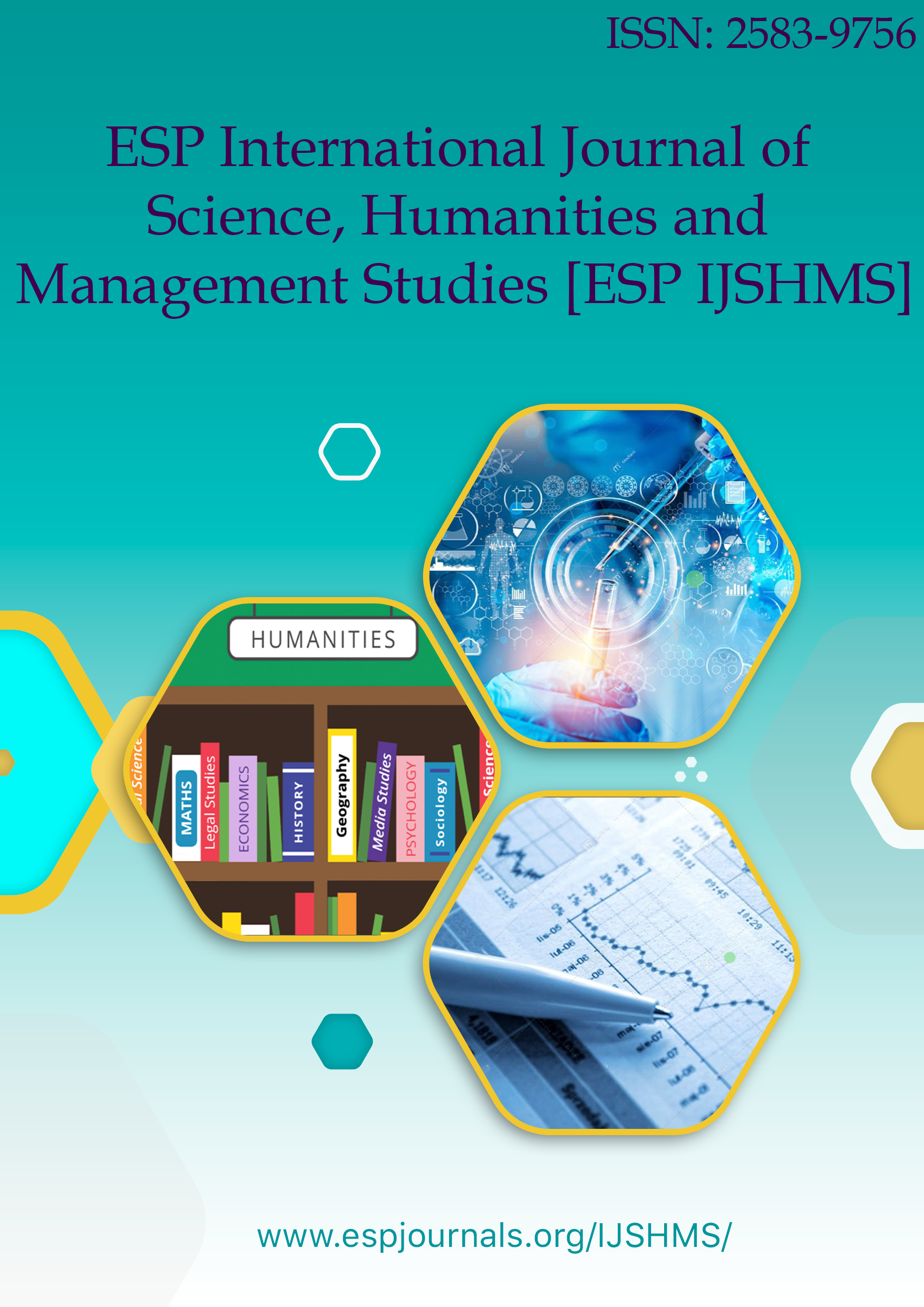ESP International Journal of Science, Humanities & Management Studies(ESP-IJSHMS)

Autonomy, Agency and Empowerment in Sustainable Community Development: The Imperative of Critical Philosophical Thinking (CPT)
© 2023 by IJSHMS
Volume 1 Issue 3
Year of Publication : 2023
Author : Ikeagwuchi Ikechukwu UKWUOMA, Benignus Chukwunonso EZE, Samuel Ojodomo SIMON
 : 10.56472/25849756/IJSHMS-V1I3P102
: 10.56472/25849756/IJSHMS-V1I3P102Citation :
Ikeagwuchi Ikechukwu UKWUOMA, Benignus Chukwunonso EZE, Samuel Ojodomo SIMON, 2023. "Autonomy, Agency and Empowerment in Sustainable Community Development: The Imperative of Critical Philosophical Thinking (CPT)" ESP International Journal of Science, Humanities & Management Studies(ESP-IJSHMS) Volume 1, Issue 3: 14-21.
Abstract :
Nigeria seeks a safe and sustainable community development which has given rise to workshops locally. Globally, there are constant talks on the need for cohesion, inclusiveness and community-driven development, acquisition of which lies in equity and inclusion of everyone and the realization that even the little child has something to offer. However, the Nigerian community (from the family to the political structure) suffers from non-inclusion and inequity. For example, parents try to get the life they did not live through and in their children causing such children not to be original, authentic, to have their own voice, to exercise agency and autonomy. In the community, few are empowered while the rest are left to eat from the crumbs that fall off the table. So, how aware are individuals of their amazingly unique qualities? How many individuals have discovered themselves? Does self-discovery come before acquisition of knowledge? This paper aims to show that sustainable community development rest on certain qualities such as autonomy, empowerment and agency. Through the method of critical philosophical thinking (CPT) this paper argues that agency, autonomy and empowerment are the pathways to sustainable community development. The paper concludes that CPT is required in order to establish the qualities of autonomy, empowerment and agency as they all share a nexus.
References :
[1] AKE, C. [Development of what? For what? A paper presented at a conference on Development Strategies in Africa of the 1970’s. DSP: Tanzanaia], 1972
[2] ASIEGBU, Martin F. “Philosophy and Sustainable development,” [The Humanities and Sustainable Development], pp. 101-114. Rex Charles & Patricks: Nimo, 2011
[3] CARTER, Adam J. “Intellectual Autonomy, Epistemic Dependence and Cognitive Enhancement,” [Synthese 197], pp. 2937–2961. 2020 https://doi.org/10.1007/s11229-017-1549-y.
[4] CHINWEUBA, Gregory E. “Philosophy and Sustainable Development in Nigeria: A Critical Analysis,” [Nnamdi Azikiwe Journal of Philosophy], pp. 41-54. 2019. Vol. 11. No. 1
[5] CHIMAKONAM, Jonathan O. & Oluwagbemi-Jacob, Dorothy N. “The Imperatives of Critical Thinking in Intercultural Philosophy,” [Philosophia Africana], pp.100-117. 2020. Vol. 21. No. 2
[6] DALE, Ann & Sparkes, Jennie. “The Agency of Sustainable Community Development,” [Community Development Journal], pp. 476-492. 2011. Vol. 46. No. 4
[7] DONZEL, Marie. “What is Empowerment?” [EVE Programme] https://www.eveprogramme.com/en/27398/empowerment/
[8] CHINWEUBA, Gregory G. & EZEUGWU, Chukwudi E. “Inauthenticity in Development: A Philosophical Study of Nigerian Unsustainable Development” [International Journal of History and Philosophical Research], pp. 1-12. 2018. Vol. 6, No. 1
[9] FLORES, Roberto. “Community Autonomy: The El Sereno community in Northeast Los Angeles,” [Motion Magazine] https://www.inmotionmagazine.com/chprop.html
[10] LO, Jasper. “Nigeria Tops India as the Country with the Most Extreme Poverty” https://www.globalcitizen.org/en/content/nigeria-replaces-india-most-extreme-poverty/?gclid=CjwKCAjwyqWkBhBMEiwAp2yUFpoIcnQVDtkEJLo0NXST_YPFUd_AfL4adYbF36UXbNuIVJ8witGYHXhoCbUUQAvD_BwE
[11] NWONWU, Chiagozie, MWAI, Peter & IGONIKON, Karina. “Nigeria election: The mystery of the altered results in disputed poll” https://www.bbc.com/news/65163713
[12] OZOEMENA, Leo. C., UGWU, Anayochukwu. K. & UKWUOMA, Ikeagwuchi I. “Okolo’s Conception of Personhood and the Question of Human Rights: An African Perspective,” [Nigerian Journal of Philosophical Studies], pp. 109-130. 2022. Vol. 1. No. 2
[13] OBIAGELI, Caroline. “Towards a Safe & Sustainable Communities through Community-Driven Development (CDD) Approach”. [Keynote Address delivered at 2-Day Workshop]
[14] Tassinari, M. G. “Encouraging autonomy through a community of practice: The role of a self-access centre,” [Studies in Self-Access Learning Journal], pp. 157-168. 2017. Vol. 8. No. 2
[15] UKWUOMA, Ikeagwuchi I. “Okolo’s African Being-with and Heidegger’s Idea of Mitsein: A Cross Cultural Dialogue,” [Sociology and Anthropology], pp. 1-11. 2023. Vol. 11. Issue 1
[16] UGWU, Anayochukwu K, NGWOKE, Hillary C. & UKWUOMA, Ikeagwuchi I. “Okolo’s Defence of African Philosophy and its Problems,” [APPON Philosophical Quarterly], pp. 92-103. 2022. Vol. 1. No. 1
[17] Wenger, Etienne. “Communities of Practice: Learning, Meaning and Identity,” [Cambridge University Press: Cambridge, MA], 1998.
Keywords :
CPT, Community, Sustainable Development, Empowerment, Agency, Autonomy.

